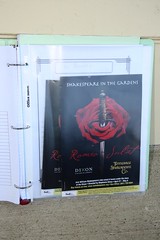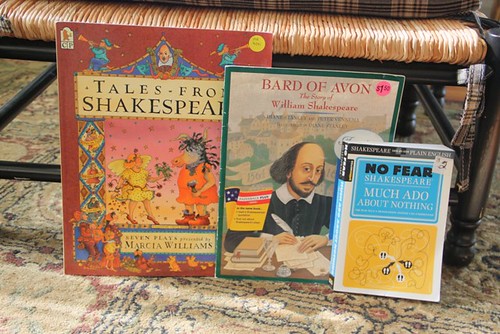I’m wrapping up the week and coming to the halfway point in the 10 Days series with a favorite of Sprite’s — William Shakespeare. In this series, I will be covering literature, but Shakespeare is so special that he gets his very own post.
Why Study Shakespeare?
1. Cultural Knowledge
As the premier author of the English language, an educated person must know about Shakespeare, his plays, and his poetry. Shakespeare is an unquestionable part of the canon of English literature. The Bible is another cornerstone work of literature, and Shakespeare and the Bible are great complements to one another.
There is actually a lot of the Bible in his dramas (mostly the Geneva version as the King James Bible was translated in his day at the end of his writing career). Take this fun quiz to see how well you know the origin of some famous expressions —Is it the Bible or Shakespeare? It’s harder than it seems.
2. Vocabulary
Shakespeare introduced countless words and expressions to our English vocabulary. Look at this huge list filled with Shakespeare’s expressions and words.
Shakespeare is Too Adult for Children
Many moms object to the adult themes and bawdy humor in Shakespeare’s plays and can’t see any reason to study his works. It is true that many of the plays have violent murder, scary scenes, and illicit behaviors. But so does the Bible.
You can approach Shakespeare the same way you do the Bible. When your children are small, you skip over the yucky parts until they are old enough to handle them. Just as you introduce young children to Bible stories so that they can appreciate the actual text once they are readers, you can slowly introduce Shakespeare to students over the course of many years.
Retellings
For young students, start with retellings of Shakespeare’s plays. There are many options available, from picture books to summaries in the public domain. When children are in third – sixth grades, just let them enjoy the stories. Building a foundation of familiarity with the plot lines and characters will make advanced study of Shakespeare all the easier in later years.
I have used these three Shakespeare retellings and highly recommend them.
- Tales From Shakespeare -text retellings
- Beautiful Stories From Shakespeare -text retellings
- Tales from Shakespeare -retellings with pictures, graphic novel format
Excerpts
Starting in middle school, choose selected excerpts to complement a retelling. The language will be a challenge, and that’s exactly why you start with a small selection instead of an entire play.
Monologues has famous monologues divided by male and female speakers. I have also used the Scholastic title Irresistible Shakespeare for middle school level Shakespeare studies.
Full Plays
In high school (or maybe as early as seventh grade for some students), read an original Shakespearean play each semester or at least each year.
There are wonderful editions out now, such as No Fear Shakespeare, that put the original alongside modern translations. Those are fantastic for making the transition from retellings to excerpts to entire plays.
See Productions

Throughout the years, see Shakespeare whenever possible. Obviously you want to select plays that are suitable. Because we were in China for so long, we had our first chance to see Shakespeare just this year. We saw Romeo and Juliet performed by the Tennessee Shakespeare Company in an outdoor venue . It was fantastic, and I was thrilled to hear Sprite laugh at all the funny parts. She had no problem understanding the Elizabethan language because of the visual context of actions, inflection, and props.
Don’t Forget the Poetry
Shakespeare’s sonnets are a great addition to your daily poetry lessons. You can find all of Shakespeare’s poetry at Absolute Shakespeare.


Ok, so I’ve been researching more about CM by reading materials from amblesideonline and simplycharlottemason. I’m beginning to see that evaluation is done with reading comprehension through narration. But, do you see the logic stage developement differently through the narrations that are produced in an evaluation of, say, Shakespeare? I’m referring not so much to the WHAT in grammar stage, but the WHY in the logic stage. Thanks for this brilliant material and encouragement through language arts.
My daughter is about the same age as Jimmie’s and she is enjoying reading some shakespeare, especially because she is interested in acting. We are finding the No Fear Shakespeare editions very helpful.
We have also used the following two books and found them enjoyable and helpful.
“The King of Shadows” by Susan Cooper a novel set in Shakespeare’s Globe.
“Shakespeare’s Storybook: Folk Tales that Inspired the Bard” by Patrick Ryan and James Mayhew. This books has 7 Folktales that have similar themes to some of Shakespeare’s plays, each tale is proceeded by a 2 page intro by the author about the origin of the tale and how it relates to the play and some bits of Shakespeare history. Our copy came with two audio CD’s of the tales.
Another plus, it’s all free! You can read any of his books online or put them on your Kindle. That’s also true for the younger version, Beautiful Stories from Shakespeare.